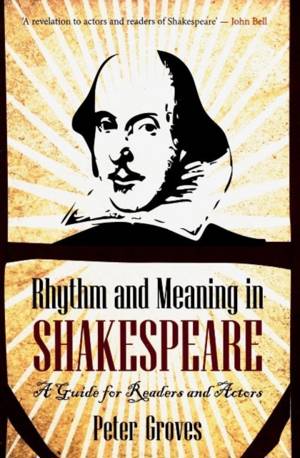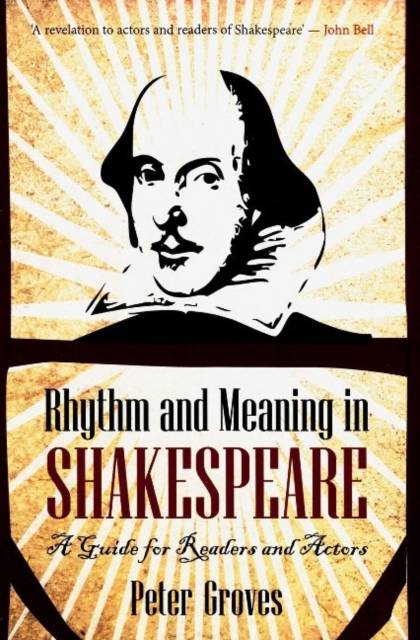
- Retrait gratuit dans votre magasin Club
- 7.000.000 titres dans notre catalogue
- Payer en toute sécurité
- Toujours un magasin près de chez vous
- Retrait gratuit dans votre magasin Club
- 7.000.000 titres dans notre catalogue
- Payer en toute sécurité
- Toujours un magasin près de chez vous
Rhythm and Meaning in Shakespeare
A Guide for Readers and Actors
Peter Groves
Livre broché | Anglais
37,95 €
+ 75 points
Description
Rhythm and Meaning in Shakespeare explores the rhythmical organization of Shakespeare's verse and how it creates and reinforces meaning both in the theatre and in the mind of the reader. Because metrical form in the pentameter is not passively present in the text, but rather something that the performer must co-operatively re-create in speaking it, pentameter is what John Barton calls "stage-direction in shorthand," a supple instrument through which Shakespeare communicates valuable cues to performance. This book is thus an essential guide for actors wishing to perform in Shakespeare's plays, as well as a valuable resource for anyone wishing to enhance their understanding of and engagement with Shakespeare's verse. Contents include: an exploration of meter and its performance - the prosody of English speech * the normal ways in which material is structured and patterned into blank verse, with its essential metrical and prosodic variations from the prototype, discussing ways in which those variations are performed * the 'short' pentameter, a feature more or less unique to Elizabethan and Jacobean dramatic verse, with its innovative use of silent beats and silent offbeats * considering how to recognize and perform such lacunae and how they function as performance indicators * the breaks and pauses within lines, and transitions between lines - how they work in the theatre, how to recognize them, and how they are performed * other kinds of spoken verse in the plays * how to explore systematically, through metrical and prosodic analysis, the possibilities of the verse for performance * appendices that cover the pronunciation - specifically, the stress-pattern - of words that differ in Shakespeare's English and the pronunciation of names in the plays. *** ". . . beautifully written, rich with meaning, humorous and deeply knowledgeable, with a full feeling for the life of the stage. Groves analyses the way that Shakespeare uses speech to create and reinforce meaning: and in so doing he engages in an alive and alert way with many of the complexities this entails. . . . this is one of the most originally conceived and useful books I've read for a long while. I am going to use it all the time in my work with the California Shakespeare Company. . . . it is just so useful for people working in the theatre and for courses in theatre practice and interpretation." - Philippa Kelly, Resident Dramaturge, California Shakespeare Theatre *** "This has clearly been a labour of love for the author who offers his detailed knowledge now for the benefit of everyone from vocal coaches and speech specialists to jobbing actors. It is a dense and precise study, all the way down to the vocal minutiae of phonetics and a guide to pronounciation of unfamiliar names in Shakespeare's plays. Do you know what a schwa is? Do you know what its influence is in scansion of a line? These and much more are explained in this master work." - Jay McKee, Stage Whispers Magazine, November-December 2013
Spécifications
Parties prenantes
- Auteur(s) :
- Editeur:
Contenu
- Nombre de pages :
- 218
- Langue:
- Anglais
Caractéristiques
- EAN:
- 9781921867811
- Date de parution :
- 22-07-13
- Format:
- Livre broché
- Format numérique:
- Trade paperback (VS)
- Dimensions :
- 152 mm x 231 mm
- Poids :
- 362 g







